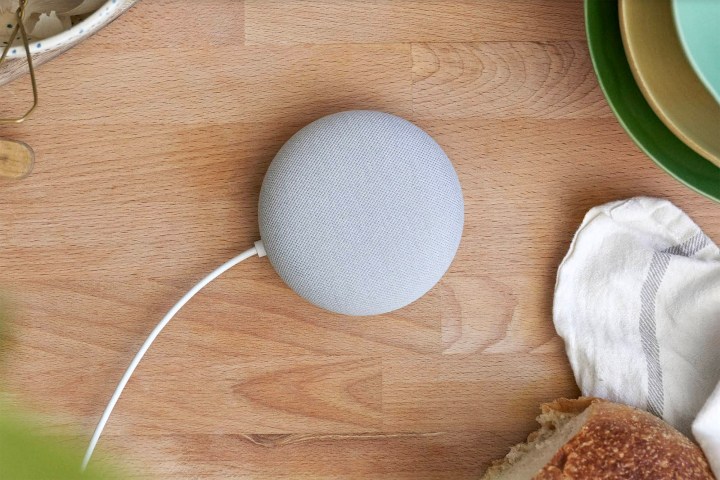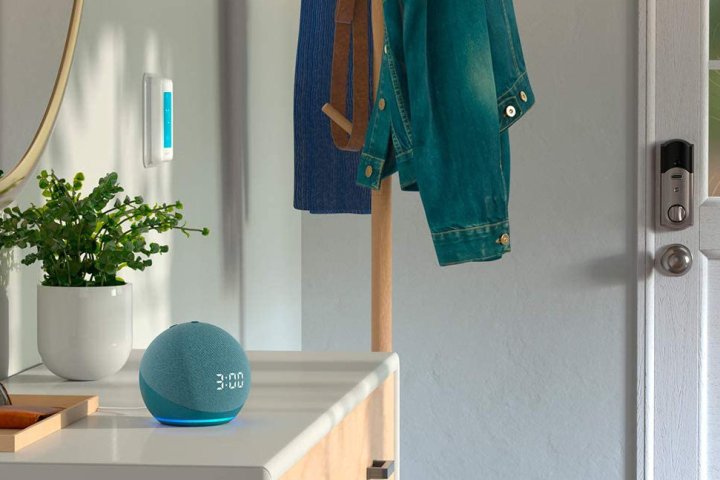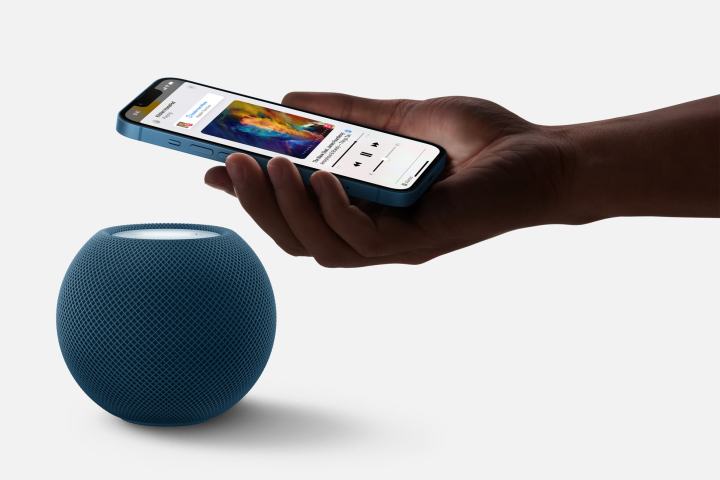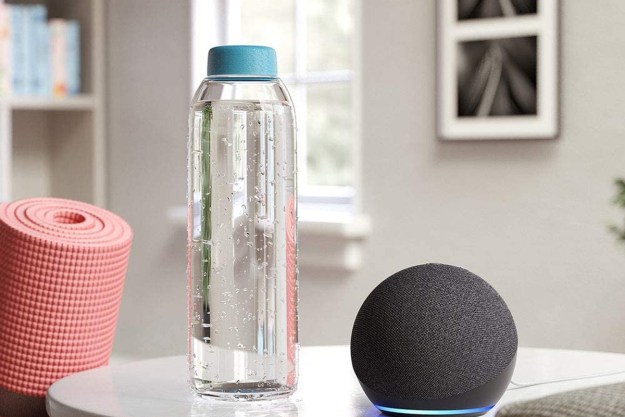We’ve recommended smart speakers for a whole range of purposes in home automation: Now it’s time to take a step back and cover some of the big questions: What is a smart speaker and why is it such an important part of the modern smart home?
- What makes a smart speaker smart?
- What’s the point of a smart speaker?
- Who makes smart speakers?
- Are smart speakers wireless?
- Is Alexa a smart speaker? What about Google Assistant?
- Can smart speakers control other devices?
- What’s the best smart speaker to buy?
- What’s the price range for smart speakers?
- Are smart displays better than smart speakers?
- How do I connect my smart speaker?
- Are smart speakers private?
- Can someone else contact me through my smart speaker?
We’re tackling every question you may have about smart speakers and popular brands, starting with the basics. Here’s everything you need to know before buying!
What makes a smart speaker smart?

A speaker’s ability to connect to mobile devices like smartphones and the other smart devices in your house is what makes it smart. That means you can link the speaker to your Wi-Fi network, and use an app on your phone to control it, as well as send it audio like music or podcasts — typically through a Bluetooth connection, but sometimes also streaming via Wi-Fi.
Those are the basics, but many speakers go beyond this. For example, today’s smart speakers usually have a built-in voice assistant that you can command with your voice. This allows them to search the internet, make lists or reminders, and interact with a wide variety of voice assistant skills, games, jokes, and guides. Their apps can often connect directly to music services like Spotify or Apple Music so you don’t have to use your mobile device to stream music to the speaker. They also typically have the option to call friends and family from their contacts, like a hands-free phone.
Beyond this, smart speakers come in a wide variety of designs and sizes. Smaller versions are designed to sit on your desk like a personal assistant, or perhaps serve as a smart alarm clock. Larger versions are made to reside in a central location on a counter or shelf where they can fill the room with sound. Mobile versions are battery-powered and generally designed to resist dust and water.
What’s the point of a smart speaker?
Smart speakers have two big advantages for the average smart home. First, you can control them anywhere via an app, which is extremely convenient for people who manage music on their phones.
Second, they combine a whole lot of smart features in one hub for easy access. That includes voice commands and voice chats, the ability to control the smart home with access to specific devices, connections to TVs or existing speakers, and more. They are always on hand to provide a wide variety of answers or complete basic tasks, from weather updates to setting timers, making them an excellent complement to other smart devices.
Who makes smart speakers?
There are a lot of names in the game. Amazon and Google are two of the biggest players, while Apple also has its HomePod line. Then, there are a wide variety of Bluetooth speaker brands that add plenty of smart features to their models, like JBL, Sonos, and Bose.
Are smart speakers wireless?

Smart speakers can be wireless, but it’s important to define what we mean by wireless. All smart speakers are wireless in that you can stream audio via Bluetooth or Wi-Fi: You don’t need to plug these speakers into an audio source to make them work.
But many smart speakers still need a wired connection for power, a cable that you plug into an outlet. Entirely wireless speakers use a built-in battery and are designed for portability — often including hooks or handles. These models tend to be smaller, which means sacrificing sound quality and other capabilities for a fully wireless experience.
Is Alexa a smart speaker? What about Google Assistant?
Alexa and Google Assistant are voice assistants, which means they can listen and respond to commands. Voice assistants can reside in apps on your phone or computer, as well as a number of smart devices around the house (including TVs and even thermostats). Since smart speakers typically have Wi-Fi connections (sometimes Bluetooth), speakers, and mics, that makes them one of the best places to include access to a voice assistant. Stationary smart speakers almost always have a built-in voice assistant.
There are three prime examples of this: Amazon’s Echo speakers, which always come with Alexa, Google’s Nest speakers, which always include Google Assistant, and Apple’s HomePods, which use Siri. Smart speakers from other brands may also include Alexa or Google Assistant.
Can smart speakers control other devices?

Smart speakers with voice assistants can create connections to compatible smart devices around the home, so you can use voice commands or create routines to control your smart home more organically. For example, you could say, “Alexa, turn off the dining room light,” or “Hey Google, start my morning routine.” Smart speakers work especially well with certain devices, like security cams with built-in audio so you can speak out of them.
However, devices have to be compatible with specific voice assistants for this function to work. Alexa generally has the broadest compatibility with other devices, followed by Google Assistant, then HomeKit compatibility for Siri. We expect compatibility to be less of an issue in the future as standards improve, but for now, it’s always good to double-check when you buy a new device.
What’s the best smart speaker to buy?
For that, we suggest you consult our guide to the best smart speakers available. We include picks from Sonos, Amazon, Google’s Nest line, and more. If you’re looking for something that’s more portable, check our guide to best wireless smart speakers.
What’s the price range for smart speakers?
Smaller speakers tend to be around $40 to $50. Larger speakers tend to start at $100 and can go up to $200 or more. There are some exceptions: Apple’s HomePod Mini, for example, is a small speaker that starts at $100.
Are smart displays better than smart speakers?

Smart displays add one more feature: A touchscreen that can display information or serve as a voice chat option via an included camera. That makes smart displays very versatile: You can use them to watch shows or informational videos, show slideshows of your photos, play interactive games, browse recipes, and so on. They can also be set to provide visual data on weather, temperatures, important notifications, and — of course — the time. The video chat capabilities are also nice if you like talking face-to-face, and can be used to get livestreams from your security cams, too.
In exchange, smart displays require placement in a spot where the screen is highly visible, and their speakers are often more constricted. Some users also don’t want another screen in their house. So choosing between a smart speaker and a smart display comes down to what’s important to you.
How do I connect my smart speaker?
You’ll manage setup and connections via your smart speaker app. For more information, check out our guide on setting up an Echo or setting up a Nest device. You may also want to take a look at our smart speaker troubleshooting guide if something goes wrong.
Are smart speakers private?
Smart speakers have mics that are listening for activation words to voice commands. They may also save commands for analysis later on. These settings can easily be adjusted: You can manually turn off mics on the latest smart speakers, and change if — and for how long — you want any of your voice commands saved in your history. Here’s our guide on how to change privacy features on an Amazon Echo.
Can someone else contact me through my smart speaker?
Your app-based contacts (which you can manage) can try to call you on a compatible smart speaker, but you don’t have to answer — just like a regular phone. The exception is Alexa’s “Drop In” feature, which gives special people permission to automatically start speaking/listening through Echos.
Editors' Recommendations
- Ring Video Doorbell buying guide: Which is best for you?
- Can you use a Blink Outdoor Camera without a subscription?
- The best smart speakers for 2024
- Cordless vs. robot vacuums: which one should you buy?
- The best Google smart speakers of 2023




